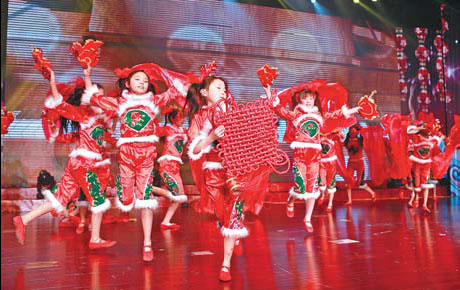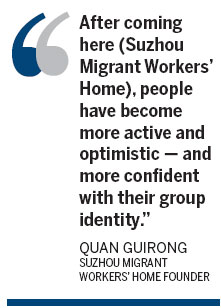Migrant workers' Spring Festival gala
Updated: 2013-02-05 10:36
By Han Bingbin (China Daily)
|
|||||||||||
 |
|
A group of migrant workers' children stages a dance. Photos provided to China Daily |

For example, during this year's gala, Duan Yu from Northeast China described the frustrations of her mobile life in her song Moving Home and expressed her longing for a steady job and home. In his song Payslip, Yan Qingjun describes how he was trapped between the anticipation of a payslip and his anguish that the payslip has restricted his life.
Both working in Suzhou, Duan and Yan are part of an active community called Suzhou Migrant Workers' Home, where their group comes together to compose songs and create stage dramas for their community of migrants. Besides performances, the home also offers a free reading rooms, various interest groups, legal consulting and - most importantly, according to its founder Quan Guirong - a chance for otherwise lonely workers to share their feelings and working experiences in a place where they feel at home.
"After coming here, people have become more active and optimistic - and more confident with their group identity," Quan says.
After traveling to a dozen cities and working a dozen jobs, Quan hit upon the idea of establishing a workers' home in 2003. He himself had craved a more fulfilling life and a sense of belonging. But a lack of funds forced him to put aside the idea until 2008, when he put together 40,000 yuan to launch a reading room in Suzhou. Later he won financial support from Oxfam that has enabled him to expand the project.
The Hong Kong-based NGO now financially supports 12 migrant-worker service institutions in major coastal provinces. According to their statistics, by founding their own art troupes and publishing magazines and music albums, these institutions have provided cultural services to more than 1 million migrant workers.
|
 |
|
 |
|
 |
In addition to meeting growing needs for self-expression and development, these institutions help migrants integrate and find their place in the community, says Lu Meihua, Oxfam's livelihood assistance program officer.
Some of these institutions are also winning support from local governments. For example, Suzhou officials have provided the migrant workers' home there with free space. The local government has also started to buy their services, such as hiring them for community weekend film-screening events.
Some migrant workers in neighboring cities have regularly traveled to these places to enjoy the good company and a sense of home. Some frequently ask Quan to expand the services to their cities. That's why, even though private and public support has helped them toward a sustainable future, Quan still wants to "do bigger and better".
One good example might be Sun Heng's art troupe, now called the New Worker Art Troupe, which has evolved from its original base in the capital's Picun neighborhood into a complex of service institutions for migrants.
In 2005, the troupe released its first album. With the royalty income, 75,000 yuan, the group founded a school that now has nearly 500 students, all children of migrants from across the country. Now known as the Beijing workers' home, their main undertakings have included a chain store selling cheap second-hand commodities, a training center, a migrant-worker culture museum and a theater.
Just like the annual gala show, Sun says, all these efforts are designed to create a new culture of labor and call on people to respect the value of labor.
"But one institution's power is limited. We need numerous workers' homes," Sun says.
Contact the writer at hanbingbin@chinadaily.com.cn.
Related Stories
Make decorations and snacks to greet Spring Festival 2013-01-31 14:12
Prices for Chinese liquor drop ahead of Spring Festival 2013-01-31 10:16
Spring Festival travel fashion 2013-01-30 17:02
Sanya crushed by Spring Festival tourist rush 2013-01-30 10:25
Chinese people prepare for Spring Festival 2013-01-29 09:45
Today's Top News
Police continue manhunt for 2nd bombing suspect
H7N9 flu transmission studied
8% growth predicted for Q2
Nuke reactor gets foreign contract
First couple on Time's list of most influential
'Green' awareness levels drop in Beijing
Palace Museum spruces up
Trading channels 'need to broaden'
Hot Topics
Lunar probe , China growth forecasts, Emission rules get tougher, China seen through 'colored lens', International board,
Editor's Picks

|

|

|

|

|

|





